A few weeks ago I wrote a blog called “Good First Reads About Jesus’ Jewish Context” which shared what I’d give to people who are just beginning to learn about Hebraic studies. Many of you wonder what else I recommend.
 You’d think that the next books I’d suggest would be more history. But discipleship is my priority, and there’s one author whose books have had a profound impact on my daily life — Joseph Telushkin. You might be surprised, but he’s an Orthodox rabbi.
You’d think that the next books I’d suggest would be more history. But discipleship is my priority, and there’s one author whose books have had a profound impact on my daily life — Joseph Telushkin. You might be surprised, but he’s an Orthodox rabbi.
Rabbi Telushkin has written numerous volumes on Jewish culture and history, but his collections of Jewish ethics have been key to my “walk,” because they’ve helped me frame Jesus’ teachings within the larger world of Jewish thought. Several of themes in Walking in the Dust of Rabbi Jesus referred to his work, including judging favorably, giving with a “good eye,” and avoiding lashon hara (gossip).
If you want to grow more Christ-like in your approach to life, I highly recommend the following, which are available as e-books too. (But note, they are Jewish, and not Messianic — Christian readers shouldn’t expect to agree at every point.)
~~~
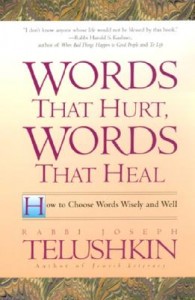 Words that Hurt, Words that Heal – (Quill, 1996) Focuses on how to use (and not use) your tongue. Discusses gossip, anger, criticism, as well as how to bless people with your words. My chapter called “How to Have a Kosher Mouth” in Walking in the Dust used this book as a resource. Read an exerpt of the chapter here.
Words that Hurt, Words that Heal – (Quill, 1996) Focuses on how to use (and not use) your tongue. Discusses gossip, anger, criticism, as well as how to bless people with your words. My chapter called “How to Have a Kosher Mouth” in Walking in the Dust used this book as a resource. Read an exerpt of the chapter here.
Very practical and readable — kind of a self-help book, but based on biblical laws regarding ethics of speech.
~~~
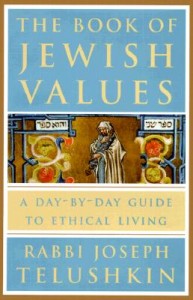 The Book of Jewish Values (Bell Tower, 2000) A year of daily readings about how to live with integrity in a morally complicated world.
The Book of Jewish Values (Bell Tower, 2000) A year of daily readings about how to live with integrity in a morally complicated world.
Some friends and I decided to read this book together, and we lingered over it for a couple years because we didn’t want to miss a single reading. Often the book’s profound biblical wisdom challenged us to change how we lived.
We’d ruminate over topics like:
Finding Excuses for Behavior that Seems Unkind
Prevention of Cruelty to Animals: What the Torah Says
When, If Ever, Is it Permitted to Lie? (There are 3 reasons.)
What the Fifth Commandment Demands of Parents
Is Your Work Sacred?
~~~
Rabbi Telushkin is now working on a three-book compendium called A Code of Jewish Ethics. Two volumes have been published.
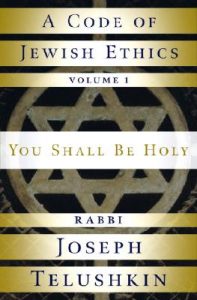 The first, You Shall Be Holy, (Bell Tower, 2006), on personal character and integrity, won the National Jewish Book Award. It includes sections on ethics of speech, judging favorably, anger, repentance, humility and gratitude. (My friends and I are enjoying this book right now.)
The first, You Shall Be Holy, (Bell Tower, 2006), on personal character and integrity, won the National Jewish Book Award. It includes sections on ethics of speech, judging favorably, anger, repentance, humility and gratitude. (My friends and I are enjoying this book right now.)
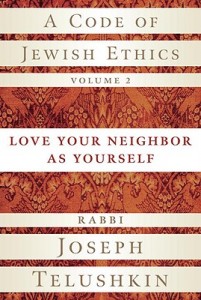 The second, Love Your Neighbor as Yourself (Bell Tower, 2009) is about how to apply these famous words to daily life. We Christians know these words from Jesus, but he was quoting from his Scriptures. Judaism has emphasized the centrality of this commandment as well, and has much wisdom about how to live it out.
The second, Love Your Neighbor as Yourself (Bell Tower, 2009) is about how to apply these famous words to daily life. We Christians know these words from Jesus, but he was quoting from his Scriptures. Judaism has emphasized the centrality of this commandment as well, and has much wisdom about how to live it out.
(The third volume, which is not yet available, will deal with family and community.)
~~~
(Me and my meshugenah (crazy) friends, Shirley, Hillari and Kathleen – April 2005.)
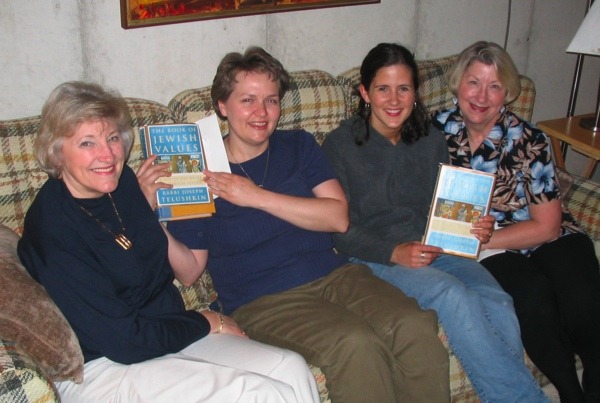
Joel says
I get the point, but I’m unhappy hearing Jesus referred to as a rabbi. It’s so far below and so much less than He really is, and it always reminds me of the way Muslims refer to Him as a mere prophet.
Lois Tverberg says
I’m guessing you haven’t read any of my books, which start off with a discussion about calling Jesus “rabbi.” It’s in no ways a minimization of his reality as the Son of God. In the gospels, the word “rabbi” is actually spelled out in Greek in many places because that was what his disciples called him. The reason I use that term is to highlight the fact that the great commission is that we make disciples of all nations, and in order to do that we need to understand Jesus in his earthly reality and be his disciples ourselves.
Dr Michael Wodlinger says
The term ‘rabbi’, as it was used in the 1st Century is a far different word than used now. Then, rabbi meant ‘great one’. Only those who were considered to be great teachers, masters actually, were given the title Rabbi. There was no 3-4 year internship at a Yeshiva, although teachers of that era needed to have memorized and understood Torah, Prophets, Writings and Mishna. Notice, in John 3, Nicodemus, himself a Torah scholar, referred to Yeshua as ‘Rabbi’, raising Yeshua above himself.
Cynthia Prentice says
Thanks for this post Lois! All these books are new to me and I’m looking forward to reading them.
Reg Munro says
As a recent reader of the three books I wonder where I could read something about evening meals that would expand my understanding and insight into what was going on at he last supper. Have you any suggestions? Thanks
Judah Gabriel Himango says
Thanks for the recommendation of Telushkin’s writings.
Izzy says
These are things often taught to Jewish elementary school students!
Karen Sutton says
@ Reg Munro
The “Last Supper” was a Passover Feast –
While not exactly the same as what is celebrated today, there is a lot of imagry, understanding what goes on in a Passover Feast will shed some light on what was going at the “Last Supper”.
For example, the Matza (the bread) is to be unleavened (made without a rising agent such as yeast – yeast represents puffing up/sin) also, to remind the children of Israel that their ancestors had to leave Egypt in a hurry and didn’t have time for their bread to rise. Yeshua, as the “Bread of Life” is sinless and humble.
The wine – during the Passover, there are several cups of wine -each one with a purpose – the cup of redemption is the one where Yeshua proclaimed that this is His blood – Blood on the doorposts of the houses of the children of Israel is what protected them from the Angel of Death – likewise, Yeshua’s blood offers us protection/redemption from death.
HTH
One of my favorite resources is the website: “Hebrew4Christians”.
Jan says
A book that I would recommend for insight into the last supper/passover meal is “Christ in the Passover” by Cecil and Moishe Rosen. I think it is still available through Amazon.
Joel says
Thanks, Lois. Point taken.
I wonder if you or some of your esteemed commenters can explain why the Synoptic Gospels indicate that the Last Supper was a Passover meal while John’s Gospel, on the other hand, has Jesus dying as the Pesach lambs were being sacrificed, which would have happened BEFORE the meal.
Lois Tverberg says
You’ll find the discussion on Passover you’re looking for on this page. See the comments below it. I shared one link there that specifically addresses your question.
Phil says
Just wondering if you’d have any recommendations for resources dealing specifically with the Good Samaritan parable from a 1st century cultural perspective? I have Ken Bailey’s explanation of it but was wondering if there might’ve additional ones you’d recommend. Thanks.
Lois Tverberg says
I spent some time discussing the Good Samaritan parable on pages 62-64 of Walking in the Dust of Rabbi Jesus. The parable is based on a story from 2 Chronicles 28:1-15. The rest of chapter 5 (p 55-65) shows how it relates to the lawyer’s question about “loving your neighbor.”
Phil says
Thanks Lois. I’ll look at that chapter for sure.
chiefer says
Thanx for this recommendation. I can understand your appreciation for the Orthodox rabbi very well. It was the same for me with Rabbi Jonathan Lord Sacks. What a brilliant mind, what deep thoughts, what an understanding of Torah. I am deeply moved by his teaching everytime I read him.